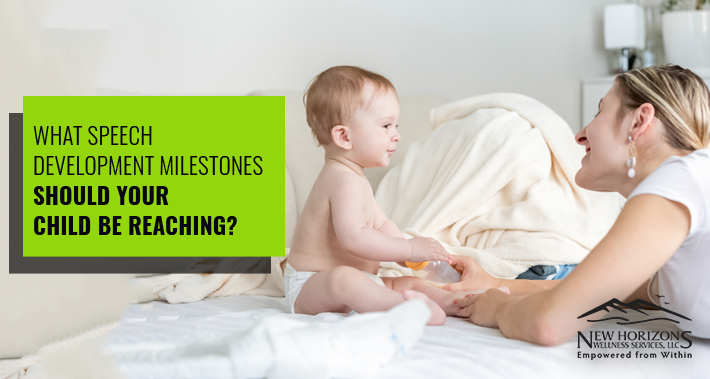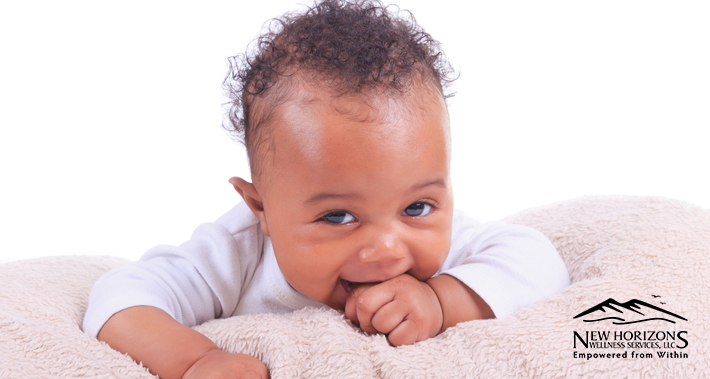
Every child learns to speak at their own pace.
Even if you know this in theory, it is easy to start worrying about your child’s speech and language development.
Knowing what language milestones to look for as your child gets older can help you worry less and enjoy their growth more.
If you do notice that your child hasn’t reached some of the age appropriate milestones listed below, contact us to work with pediatric speech and language therapy services.
What Are Speech Development Milestones?
Speech development milestones are sort of like road markers on your child’s path to learning to communicate.
In your child’s early development, these milestones include things like responding to sounds, babbling, imitation, and forming simple words and phrases.
Every child reaches these milestones at their own pace and picks up different words and skills depending on their environment.
What Are The Typical Milestones Of Language Development?
Like many early childhood skills, your little one’s language development relies on several systems growing together.
To start talking, your child must build up muscle control, train their ears, learn to recognize patterns, and much more.
These skills and abilities start developing from day one and build on one another throughout your child’s first few years.
Speech Development For Three Month Olds
By 3 months, your child should be able to:
- Smile when they see you
- Vocalize using cooing sounds
- Respond to being spoken to by getting quiet or smiling
- Recognize your voice
- Use different cries for different needs
Speech Development For Six Month Olds
By 6 months, your child should be able to:
- Babble using a variety of sounds
- Make gurgling sounds
- Express happiness or displeasure using different sounds
- Move their eyes in the direction of a sound
- Respond to changes in your tone of voice
- Pay attention to music
- Notice that some toys make sounds
Speech Development For Twelve Month Olds
By the end of their first year, your child should be able to:
- Form simple sounds like “ma ma” and “da da da” without meaning
- Understand simple instructions like “come here”
- Try to imitate your speech sounds
- Look in the direction of a sound
- Try to communicate with actions or gestures
- Understand simple words for everyday objects, like “door”
Speech Development For Eighteen Month Olds
By 18 months, your child should be able to:
- Use 4 to 10 words
- Recognize names of familiar things like objects, people, and body parts
- Follow directions made with gestures and simple phrases
Speech Development For Two Year Olds
By 2 years old your child should be able to:
- Use 50 or more words, sometimes unclearly
- Make short phrases like “more milk” using familiar words
- Make animal noises like “moo”
- Form 1 to 2 word questions like “where mama?”
- Start using pronouns like “mine”
- Follow simple directions and understand simple questions
- Speak clearly enough to be understood about half the time by you and other regular caregivers

What Causes Children To Have Speech Delay?
Environment and activities help children to develop their cognitive and physical abilities.
Talking and singing to your child, describing activities and objects, and practicing sounds and words can help your child exercise their brain.
In many cases, however, a significant speech delay can be a sign of an underlying condition.
Hearing loss, communication disorders, and developmental disorders are all possible causes for significant speech delay.
A speech therapist can help identify these underlying causes and find solutions to help your little one learn and grow.
Can A Child Outgrow A Speech Delay?
Some children with speech delays do eventually reach all their key milestones on their own, but this is not always the case.
You can support your child’s speech development using at home activities like:
- Singing songs together
- Reading books with your child and pointing out words
- Working on sound imitation with your child using clapping games or animal sounds
- Repeating sounds that your child makes back to them
- Practicing counting with your child
- Talking to your child as you go through your daily activities together
If you’re already doing some of these things with your child and they haven’t reached several milestones, it might be time to start working with a speech therapist.
Without support, a speech delay can sometimes lead to behavioural and learning challenges.
What Age Should I Worry For Speech Delays?
A speech or language delay can affect your child at any stage of their development.
Knowing when to get support for your little one is a question of progress rather than age.
Your baby might not pay attention to music exactly like other babies.
They might be a few words short of the average vocabulary size for their age.
If your child is a few weeks behind but they show signs of progress, little delays are not cause for worry.
If, on the other hand, your child hasn’t reached several milestones and is showing very little progress, it’s best to start working with a speech therapist.
Book Your Appointment With New Horizons Wellness Services Today
As a parent, you want to see your child thrive.
Worry can take over when your baby or toddler doesn’t show signs of progress towards key language milestones.
The support of a speech therapist can help your child develop their skills and help ease your concern.
To help your child find their voice, book your appointment with New Horizons Wellness Services today.
Yours in Health,
New Horizons Wellness Services13333 SW 68th Pkwy,
Tigard, OR 97223
- https://g.page/newhws
New Horizons Wellness Services provides a true multidisciplinary approach to mental & physical health treatments for children, adults and families.
